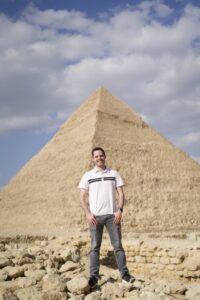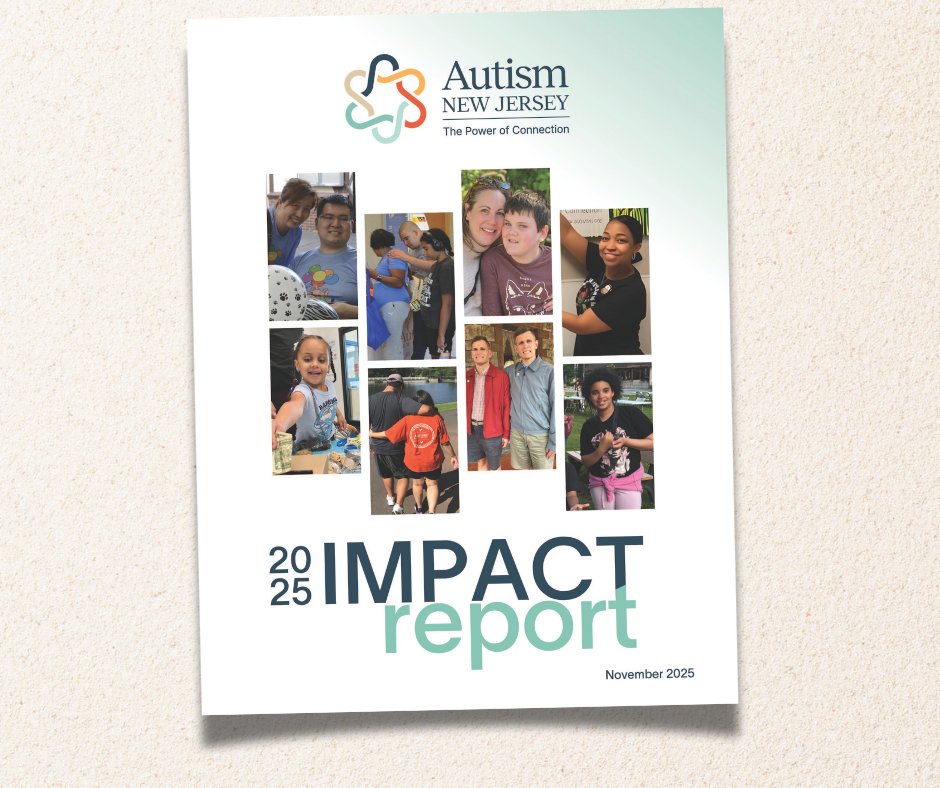By Cassidy Grom
Director of Programmatic Impact Dr. Joe Novak has been a fixture in the New Jersey autism professional community for the past twenty years. He holds a unique combination of degrees and certificates, making him one of a select number of professionals in the world to have certification in both speech language pathology and applied behavior analysis – in addition to his credentialing as a RESNA-certified Assistive Technology Professional. Dr. Novak leverages that expertise to support training for the state’s autism professionals and works with all the teams within Autism New Jersey to create state-level impact.

Joe on his first (of many) trips to Egypt.
This week we sat down with him to talk about his professional career, trends he sees in the field, and his favorite travel spots. This interview has been condensed and edited and is the third in a series of interviews with the Autism New Jersey staff.
CG: How did you get into this field? What’s your professional background?
JN: One of the most impactful moments of my life was in an undergraduate exceptional child psychology class. We watched a video of people with disabilities including a child named Charlie who was a quadriplegic. It was really my first exposure to people with disabilities, and I just remember feeling overcome with the idea that helping to support and improve the lives of individuals with disabilities was something I should do.
So, I went back to school to study speech pathology, and I realized if I was going to work with kids with autism, I really should be just as fluent in ABA. So, I graduated simultaneously with both a degree in Speech Language Pathology from Kean and a certificate in ABA studies from Penn State.
Then I spent a few years working in schools as a speech language pathologist but soon moved into school leadership roles. So, most of my career was spent in director-level roles, overseeing curricula, assessments, Individualized Education Programs (IEPs), and supporting and mentoring behavior analysts and speech pathologists. During that time, I went back and got my doctorate in special education from Nova Southeastern, and since 2023, I’ve been working at Autism New Jersey. Working here is very different than in a clinical setting, but it’s great because I get to help families and professionals statewide.
CG: I’ve heard that combination of expertise in both speech language pathology and applied behavior analysis is rare.
JN: Yes, that is true! As of this year, there are only 500 or so people in the world who hold both SLP and BCBA credentials. Because it is a pretty rare combination, many fellow BCBA/SLPs are delighted to call themselves “unicorns.”
I’ve found that the two fields of study really complement each other. Speech Language Pathology taught me what to teach (related to language) and the ABA field taught me how to teach by breaking skills down into manageable parts. As a clinician, I would integrate both when I worked with children.
CG: You wrote your doctoral thesis on augmentative and alternative communication (AAC). What trends and changes have you seen in the field when it comes to AAC?
JN: Anywhere from 25 to 50 percent of individuals with autism will fail to develop effective vocal speech. When someone can’t express themselves, that means they are not going to get their wants and needs met; they are going to struggle to engage in appropriate social interactions; and that means they may resort to using challenging and problem behaviors to get their wants and needs met. Providing methods for individuals with autism to effectively communicate is incredibly important to ensure they lead happy and fulfilling lives. So AAC can often have a crucial role in this.
It’s an area of expertise for me — I have academic training in it, and I’ve held leadership roles in districts and schools, including conducting AAC evaluations. Sometimes people with autism present with challenging behavior, and the first thing you must ask yourself is “are they able to communicate effectively?” Imagine if you couldn’t communicate – you would likely resort to challenging behavior to get your needs met if that’s what it took.
The advent of tablet technology has been a game-changer for special education. Prior to tablets and iPads being widely available, there was some technology, but these devices would typically cost $7,000 to $8,000 and had to be funded by insurance. But now, tablets are nowhere near that cost, and it has truly changed the game on who can get access to these tools. Rather than wait months and months to get an insurance company to approve the purchase, parents can now just go out and get a tablet, download the software and get started right away.
To me, it’s interesting to see how the dynamic has changed. Parents are no longer reliant on professionals to get these tools, which is kind of a great thing and a potential challenge. It’s wonderful the technology is so widely available, but it means that sometimes parents choose the wrong software for their children’s needs, or the child isn’t properly taught how to use it. Unfortunately, this means there are also some “snake-oil salesmen” out there that promise miracle cures but are often unrealistic.
CG: Tell me about your job at Autism New Jersey.
JN: I’m responsible for a range of our programs and services and have a key role in our strategic planning and annual outcomes reporting. I oversee much of our professional education offerings with the most significant part being that I put together the program for our annual conference (which attracts more than 1,200 attendees every year). I review the workshop proposals, evaluate the CEU potential, develop the tracks/themes, and decide on the sequence of sessions. Throughout the year, I keep tabs on professional communities to get a sense of new trends and new research, and I work to curate the continuing education credits that will keep New Jersey’s autism workforce up to date on best practices. This year, I’m excited to return to the presenter world because I’ll be doing a session on AAC.
Within that same vein, I also oversee training for our partners at the Children’s System of Care (CSOC), which is part of New Jersey’s Department of Children and Families. My colleagues and I have a number of on-demand trainings that we created for CSOC and we also host monthly connection sessions which are opportunities for care managers to come together in collaborative discussions.
And then last, I provide oversight to the communications and law enforcement teams. Both teams have excellent leaders, and I’m there as a sounding board for everyone to make sure we have a unified voice as an agency.
CG: Do you use your clinical background in your day-to-day work at Autism New Jersey?
JN: In many ways, yes. Engaging in evidence-based practice is of the upmost importance. When you’re serving people with autism, every minute counts. You want to make sure you are effectively using your time and your money, so you don’t spend your resources on things that haven’t been well-established.
It’s a challenging time to live in an era of social media. You can go online and see something that looks good, sounds good, promotes itself as a miracle cure or quick fix. But the reality is that quality intervention takes time, hard work, and dedication. So, we endorse ABA here at Autism New Jersey because it is science-based and has shown that, over time, clients can make gains.
Part of my job is vetting everything we publish online or formally recommend as treatments. We make sure there is evidence to back it up. I review our conference vendors and speakers to make sure everything they are selling or endorsing is not shown to be harmful for individuals with autism.
CG: Thanks for sharing! I have a few questions purely for fun, if you don’t mind. First, I heard you are a big LEGO fan. How big of a fan are we talking?
JN: I probably have 40 LEGO sets on display in my home right now. We are running into a space issue at the house — we might have to make some difficult cuts. I may have to get rid of some couches to make room for more LEGOs. My favorite one is the Rivendell set from the Lord of the Rings. It is about 6,000 pieces, and is very, very detailed. It’s a beautiful LEGO set, with intricate brick building, and I especially love it because Lord of the Rings is one of my favorite movie series.
CG: What else do you do for fun?
JN: My husband and I love to travel. My favorite spot in the world is Maui, but I also have loved going to Germany, Italy, and most recently, Canada. I also have a best friend who lives in Egypt so every six months or so I go halfway across the world to a place that is just completely different from anything I’m used to – and I love it! Although I love exploring the world, I am truly a Jersey boy at heart. People who aren’t from New Jersey don’t realize how diverse the state is. There is a lot of beauty and diversity. I love the fact that within 45 minutes you can be anywhere: cities, parks, and of course, everywhere you go, there is delicious food.









